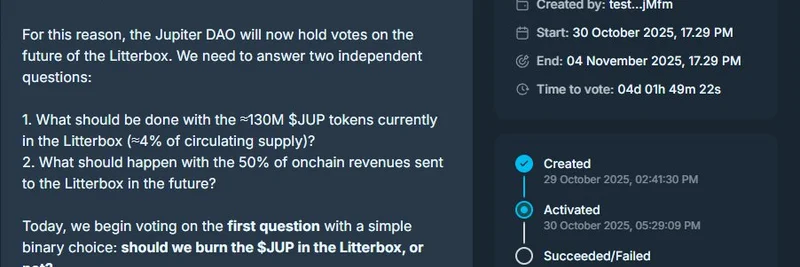In the fast-paced world of Solana's DeFi scene, Jupiter Exchange is making waves again with a crucial DAO vote that's got the community buzzing. A recent tweet from crypto trend spotter PixOnChain highlights how Jupiter is listening to its users and pushing forward with changes that could reshape the project.
The spotlight is on the "LitterBox" – a trust set up earlier this year to collect 50% of Jupiter's on-chain revenue and use it to buy back $JUP tokens. This was meant to align incentives and build up a DAO capital reserve. But after community feedback, it's clear that decisive action is needed to benefit all $JUP holders.
The proposal, titled "Burning the LitterBox," is now live on the Jupiter DAO voting platform. It poses a simple binary question: Should the DAO burn the approximately 130 million $JUP tokens currently in the LitterBox (about 4% of the circulating supply)? If approved, this burn could torch around $46 million worth of tokens at current prices, potentially boosting scarcity and value for remaining holders.
PixOnChain notes that opinions are split – some want to burn for deflationary effects, while others prefer redirecting funds to rewards or marketing. Either way, it feels like a "real reset" for Jupiter, especially alongside other updates like reducing the unstaking period to 7 days and cleaning up DAO processes.
But that's not all. Jupiter is rolling out innovative limit order features, including private orders, bundling stop-loss (SL) and take-profit (TP) together, and even market cap limits. These tech upgrades are turning heads and positioning Jupiter as a more advanced DEX aggregator on Solana.
Adding to the excitement, the first ICO on Jupiter's DTF (Dynamic Token Funding) platform is on the horizon. PixOnChain mentions they'll be there, eyeing a solid allocation. With these developments, @JupiterExchange is starting to feel "alive again," hinting at a possible "Solana summer" resurgence.
For meme token enthusiasts and blockchain practitioners, this vote underscores the power of community governance in DeFi. Burning tokens isn't new in crypto – it's a common tactic to reduce supply and potentially drive up prices, much like we've seen in various meme coin projects. If it passes, it could set a precedent for how Solana protocols handle treasury management.
The vote kicked off on October 30, 2025, and runs until November 4, 2025. If you're a $JUP staker, now's the time to weigh in. Head over to the Jupiter DAO forum for more discussion or cast your vote directly.
As Solana continues to evolve, moves like this from Jupiter could spark renewed interest in the ecosystem's meme and DeFi tokens. Stay tuned – this might just be the catalyst for the next big pump.



